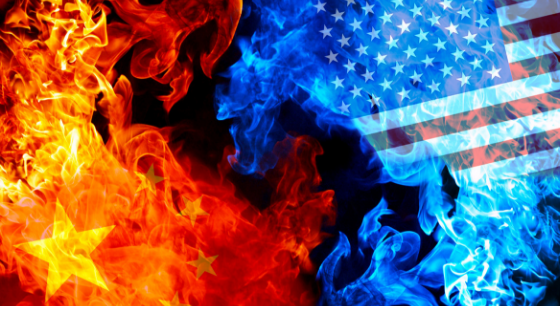Excerpt: “Fundamentally, we believe that China will do everything it can to continue to deceive the U.S., including the use of delaying tactics to continue stealing from the U.S. and in order to take considerable advantage of America’s free and open market.”
There is a Chinese proverb that translates as: “It is always better to endure short-term pain than to allow the disease to remain untreated.” This aphorism offers great wisdom in the U.S. trade war with China.
[ Bradley A. Thayer and Lianchao Han | September 3, 2019 | The Hill]
In late August, the United States and China engaged in an artillery duel over tariffs. China imposed retaliatory tariffs on $75 billion worth of U.S. goods in response to Washington’s announcement that it was extending tariffs on an additional $300 billion worth of Chinese goods. President Trump threatened to use a national emergency to push for American companies to withdraw from China. Not surprisingly, China’s state-owned media continue to express disapproval of U.S. policy.
This latest trade war escalation triggered investor panic that drove global stock markets downward, devalued the Chinese RMB to a 11-year low, and pushed funds into sovereign bonds and gold to seek stability.
In our view, this was posturing — both parties positioning themselves for a new round of trade talks in Washington.
No doubt, President Trump has been frustrated with the Chinese for resolution of a trade deal, originally negotiated by Liu He, China’s deputy premier and chief trade negotiator, but later reneged by China’s President Xi Jinping. Although talks continued in July, U.S. negotiators returned home empty-handed from Shanghai. Trump has done the right thing to step up pressure on Beijing by increasing tariffs on its goods.
Fundamentally, we believe that China will do everything it can to continue to deceive the U.S., including the use of delaying tactics to continue stealing from the U.S. and in order to take considerable advantage of America’s free and open market.
It is reported that Liu He continues to lead the Chinese trade team, suggesting that Liu still has the Xi’s trust. He recently accompanied Xi to Gansu province to visit a monument and martyrs’ cemetery of the West Route Army of Chinese Red Army, where he laid a floral basket to honor the Chinese Communist Party martyrs.
Liu again represented Xi and delivered a congratulatory letter to the 2019 Smart China Expo that opened Aug. 26 in Chongqing. During his speech, Liu called for resolution of the Sino-U.S. trade war through calm negotiation and cooperation. In response, Trump expressed his admiration of Xi as a “great leader” of China in one of his tweets.
A casual, or more-than-casual, observer might be nonplussed and ponder, “If this ‘great leader’ has fooled you twice, why would a third opportunity be provided?”
In the same speech in which he called for calm resolution, Liu argued, to no one’s surprise, that the U.S. is to blame for the trade war escalation, technology blockade and protectionism. Liu boasts that China is transforming its economy into an even more dynamic one. He contends that China has sufficient macro policy tools and means to ensure that its economy fundamentally remains sound and will maintain its momentum. Interestingly, he noted that China’s new economic growth points have been realized, and its artificial intelligence industry now is estimated to be 500 billion yuan. The subtext of his remarks is that China’s economy can absorb external shocks created by the trade war; therefore, China is not afraid of Trump’s threats.
Liu’s message is clear: First, China wants a trade deal but on its own terms. Second, pressure on China is counterproductive because it has a large arsenal to fight the trade war and counter U.S. moves.
U.S. options are straightforward: Endure short-term pain, or let the Chinese cancer to erode its free-market economy.
In 1987, China’s trade surplus with the U.S. was only $2.7 billion, one-twentieth of Japan’s. By 2018, the People’s Republic of China’s trade surplus with the U.S. had reached nearly $418 billion, 150 times what it was three decades ago. In the past 30 years, China has snatched an astronomical $4.4 trillion from the U.S. Additionally, there is an estimated $300 billion to $600 billion annual loss from China’s theft, and at least 3 million highly paid U.S manufacturing workers lost their jobs because of competition from China. Chinese government-subsidized or forced labor produced billions of dollars worth of cheap goods that have been dumped onto the U.S. market.
This newly gained wealth has helped China create a dystopian nation, modernize its military into a formidable force, take the South Sea as its inland water, expand its political influence globally, rewrite international laws and norms, export its ideology and development model to developing countries, and contend for dominance in international politics.
The U.S. must confront China’s unfair trade practices, its socialist economic structure, its intellectual property theft, its closed internet markets and other non-trade barriers. To not do so will result in the loss of U.S. position in global affairs, continued domestic economic disruption, and potentially the end of America’s greatness.
Decoupling and disengaging from China will inflict short-term pain and suffering for certain sectors, but our government and allies such as Japan can help ease it or mitigate it.
China’s strategy is to focus on a narrow scope of trade, refuse to discuss other structural problem areas, and delay the trade deal until after the 2020 election. Although it has far less U.S. imports to impose additional tariffs, it will use non-tariff measures to counter the U.S.
Accordingly, the Trump administration must do the opposite. With China currently relying on the U.S. market to keep its faltering economy afloat, Xi has no choice but to accept U.S. terms if Trump stands his ground. This is a rare opportunity for the U.S. that should not be missed.
Read the original article here.













